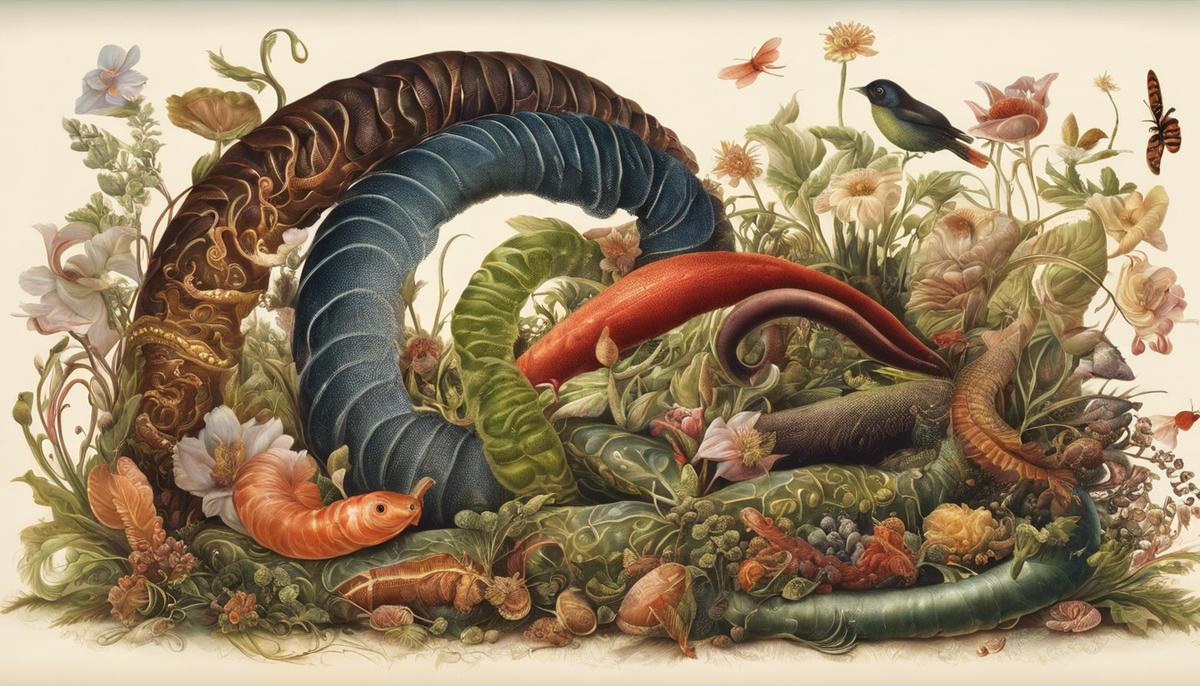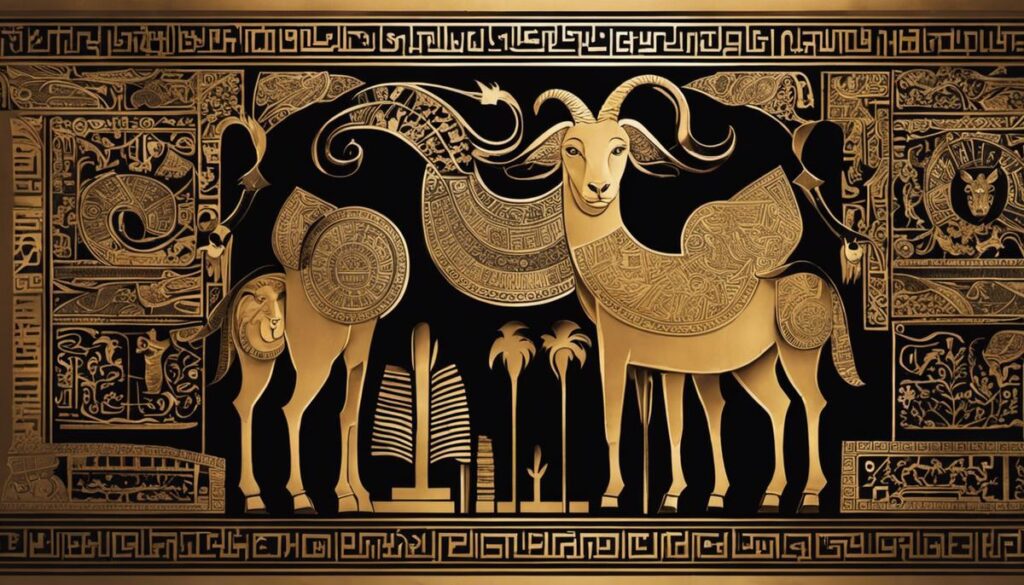Dreams, a mysterious and fascinating aspect of human existence, have long been a subject of contemplation, interpretation and even divine intervention in religious context. The Bible, one of the oldest and most comprehensive religious texts, offers numerous instances of revealed dreams, illustrating God’s guidance, prophecy or warning to His people. Among the multifaceted symbols found in dream narratives, this discussion will particularly focus on the biblical symbolism and interpretation of worms appearing in dreams. Tradition and scripture often associate worms with concepts of degradation, decay, humility, and transformation, offering a rich tapestry, rife with profound metaphoric language. This exploration dives into the historical landscape of dream interpretation, cultural influences, and actual biblical accounts involving worms to decode the potential meaning of such dreams.
Historical Context of Dream Interpretation in the Bible
In the narrative tapestry of the Holy Bible, dreams are a common yet potent thread. The Bible bears the characteristic of encapsulating truths and wisdom in the language of dreams. Across the Old and New Testaments, dreams weave a silent story of divine intervention, prophetic revelations, and metaphysical messages, evoking keen interest from researchers, theologians, and historians.
In the early books of the Bible, dreams were often direct communication channels between God and individuals. This was especially significant in a pre-modern context, wherein divine intervention in human affairs was perceived supernaturally. Such dreams provided guidance, warnings, and blessings in navigating life’s treacherous terrains.
Genesis offers the first instance of dream interpretation, disclosing Mesopotamian influence on Hebrew culture. Joseph’s dreams, wherein he saw himself reign over his brethren (Genesis 37:5-10), were a premonition of the future, revealing how dreams were instruments of forecasting. Joseph’s prowess at interpreting dreams, later proven in Egypt interpreting Pharaoh’s dreams (Genesis 41), highlights how early societies perceived and utilized dreams as metaphysical tools.
Dreams in the New Testament, viewed through a slightly different lens, were less ubiquitous but nonetheless momentous. The Apostle Matthew recounts dreams guiding crucial decisions, such as the Magi’s departure (Matthew 2:12) and Joseph’s acceptance of Mary (Matthew 1:20). Significantly, these dreams exuded divine authority, presenting an ethereal mode of communication, and serve as significant motifs linking characters’ actions to divine intervention.
The Bible appropriates dreams as a conduit for cosmic truths, subtly woven into human consciousness. Dreams helped people understand divine will, making abstract concepts of God’s realm comprehensible to humans. The historical significance of dreams in the Bible, therefore, stems from their recurring role in illustrating divine intervention, protecting the virtuous, punishing the guilty, and foretelling events. They had a profound influence on shaping the narrative path of Biblical characters and, by extension, the trajectory of theological discourse.
This exploration of dreams is a testament to the rich cultural and historical insights they offer. As we continue to delve into the past, we find that our understanding of dreams in the Bible allow us a glimpse of early religious thought and experience. They offer a fascinating study of primitive societies’ attempts to reconcile the physical and metaphysical realms in the pursuit of understanding a grander reality.
Understanding the intricate dance of dreams in Biblical times bridges gaps between the ancient and the modern world, reminding us that the quest for meaning has always been a part of our shared human experience. As much as dreams are a part of our night-time sojourns, they’ve been a part of our collective wisdom and knowledge, a testament to the power and significance of these mystical visions of the night.

Photo by randytarampi on Unsplash
Symbolism of Worms in the Bible and Dreams
Our exploration takes us deeper into the cryptic domain of biblical symbolism, specifically focusing on the representation of worms. The implicit use of worms in the Bible is deeply anchored in the collective psyche, echoing ages-old belief systems, which subtly allure us to ponder on the less-explored spiritual aspects.
The depiction of worms in the Bible carries a multivalent symbolism—oftentimes negative—emerging from the primal fear associated with decay and death, the immediate connotation of worms. In the Bible, this is manifested in Job’s humble lament, “Though I am like rottenness and worms to my own kindred,” which underscores an intense sense of self-deprecation and wretchedness. Similarly, in Acts, Herod Agrippa’s death is represented using worms, symbolizing divine punishment stemming from hubristic attitudes.
However, it is not all gloom and destruction. Worms, due to their lifecycle, symbolize resurrection and regeneration in the Bible— an etiological echo of their biological transformation. The redemptive power of the “worm” is hinted in the book of Jonah when a worm predestined by God gives the sinful city of Nineveh a second chance.
This layered biblical worm symbolism saturates dream imagery with even profounder meanings. Traditionally, dreams have been the canvas of higher agencies, employed to articulate messages shrouded in cryptic symbolism. Biblical references of worms in dreams lean heavily on their symbolic overlaps with ideas of life, death, and rebirth.
Dreams invaded by worm imagery often indicate a transitionary phase in a person’s life. The presence of a worm could signify the forerunner of metamorphosis, a much-needed change or progression. However, an adverse interpretation could suggest feelings of unworthiness, self-contempt, or an incoming retribution, mirroring the biblical perception of worm-symbolism.
Deciphering the implications of worm symbolism in dreams is an intricate process, often murky, requiring unique personal-context, emotions experienced during the dream, and subsequent emotional reactions.
A reflection on the biblical connections and underlying symbolism reveals that worms are seminal in understanding spiritual undertones, shedding light on life’s cyclical processes wrapped in metaphoric symbolism. Building this bridge between the biblical representation of worms and their implication in dreams allows us to draw closer to the labyrinth of spiritual insights fostered in our slumbering consciousness — illuminating our pursuit of meaning in the grand tapestry of existence.

Biblical Accounts involving Worms
Delving into the scriptures, worms seem as outlandish inclusions in a holy book, but their mention is far from insignificant. Worms are typically associated with decay and death, mainly due to their habitat choice. However, their symbolism in the Bible extends beyond this relatively mundane association, attaching profound spiritual meaning, both positive and negative.
One striking example is found in the Book of Job. Job, amidst intense suffering, refers to himself as a worm: “I am a brother to dragons, and a companion to owls. My skin is black upon me, and my bones are burned with heat. My harp also is turned to mourning, and my organ into the voice of them that weep” (Job 30:29-31). His self-comparison to a worm highlights his extreme misery and perceived worthlessness; it is symbolic of his degradation.
This instance of the negative depiction of worms is not singular. It is enhanced by another similar verse from Psalms “(Psalm 22:6): “But I am a worm, and no man; a reproach of men, and despised of the people.” It exemplifies the state of a man crushed to the lowliest of low, a profound image of wretchedness.
However, the Bible also uses the worm as a positive symbol. In the Old Testament, God refers to Jacob as a “worm” in a covenant promise: “Fear not, thou worm Jacob, and ye men of Israel; I will help thee, saith the LORD, and thy redeemer, the Holy One of Israel” (Isaiah 41:14). Here, the term “worm” carries a different connotation, representing humility, insignificance and helplessness, but also the possibility of divine rescue and transformation.
Now, reframing these Biblical instances with respect to dream interpretation can send us down a riveting path. Worms in dreams may carry negative connotations of decay or death—at least symbolically—but they also embody resurrection and regeneration.
Interpreting a dream where worms appear can be a complex task, depending heavily on the individual’s personal context and emotional reactions to the dream. In general, seeing worms in dreams might suggest decay, degradation, or decomposition. It could also indicate fears, negativity, or vulnerability that you might be feeling.
However, this dream imagery of worms could mirror a transformative phase or a period of personal growth, aided by the worm’s life cycle aspect—a transition from larvae to butterfly. It is a symbol of the cyclical nature of life, suggesting rebirth, renewal, or the need to shed an old life or attitude to make way for new beginnings.
These interpretations carry profound spiritual and psychological implications. The importance of worm symbolism thus underscores the complexity of Biblical symbolism and opens intriguing avenues for understanding the celestial aspects of life and the fascinating cyclicality that governs it.
Analyzing various instances of worm symbolism in the Bible and attributing them to dream interpretations reconnects us with ancient wisdom. It offers profound insight into the enigmatic, spiritual realms of human experience, allowing us to explore the metaphysical contours of our lives with a deeper, more nuanced understanding.

Cultural Influence on Dream Interpretation
Culture has a remarkable influence on interpreting dreams. Notably, Western psychology’s influence has to some extent, standardized the cognitive perceptual process of dream interpretation. However, upon investigating how different cultures interpret dreams of worms, for instance, one can perceive compelling variations. The interpretive process thus becomes an examination of reflecting sociocultural constructs.
Dreams of worms often invoke an emotional reaction in individuals, ranging from repulsion to curiosity and indicative of our deeply ingrained cultural associations. A focus on the cultural implications of such dreams helps elucidate complexities tethering the mind, emotions, and spiritual narratives.
In Western cultures, influenced heavily by Christian norms, worms might have negative connotations, often associated with decay and death. These cultures view worms in a dream as a reflection of the dreamer’s state of despair, anxiety, or inferiority. Yet, the essence of such an interpretation in Western culture emerged from Biblical narratives.
The rich tapestry of worm symbolism in the Bible is rife with paradoxical themes of death and renewal. The dialectic nature of worms can be perceived in the Book of Job, Psalms, and Isaiah, where references range from depicting extreme wretchedness to the promise of regeneration. Consequently, individuals from a Christian background might interpret dreams about worms in the context of physical or moral degradation or a transformative experience leading to spiritual awakening.
Conversely, Eastern cultures emulate a different interpretation trajectory. In Eastern philosophy and spirituality, often shaped by complexly woven narratives of Buddhism, Taoism, or Hinduism, the worm, particularly the silkworm, is a symbol of patience, serenity, and evolution. Dreaming of worms in such cultural milieu could symbolize a quiet transformation, patience amid adversity, or the fulfillment of one’s karma.
Similarly, for Native American cultures, dreams about worms can symbolize the spiritual connection to Mother Earth. It conveys a message of being grounded and connected to the circuit of life, further influencing their interpretation as a call for humility and understanding nature’s cycles.
The imagery of worms in African culture embodies both realism and symbolism. The life of a worm affirms naturalistic pursuits, humanity’s survival struggles, and life’s temporal nature. Consequently, dreaming about worms might not only symbolize survival struggles in the physical sense but also spiritual metamorphosis or the transient nature of mortal existence.
Consequently, the interpretation of worm dreams is a multifaceted process. Incorporating cultural factors in this process expands the interpretive framework and deepens psychological understanding. It underlines the importance of considering individual emotional reactions, personal context, and instantly identifiable cultural themes.
Further investigations into this topic will likely yield more fascinating insights. It is projected that ongoing research will imbibe a more inclusive study methodology, incorporating distinctive aspects of dreams. This broadened approach will take into consideration cultural peculiarities, historical factors, religious contexts, and personal narratives, refining the rich tapestry of dream interpretations and understanding the human psyche’s complexities. One can say, worms’ significance in dreams goes well beyond just symbolic interpretation. It extends into the realm of learning about the human experience and its ties with the divine, our shared history, and the cultural wisdom of our ancestors.

Case Studies: Analysis of Dream Scenarios Involving Worms
While the previous segments provided a wholly biblical perspective on the dream analysis of worms, it is equally imperative to comprehend the cultural influence on these dream symbols. Every culture perceives dream symbolism in its unique way, and worms are no exception to this.
Worms, predominantly in Western cultures, have unfortunately received negative connotations. These seemingly insignificant creatures are often associated with decay, death, and corruption, often evoking feelings of disgust and fear, which may prominently influence the individual’s subsequent emotional reactions to dreams involving worms.
Paradoxically, the symbolism attributed to worms in biblical accounts entail both positive and negative connotations. Negative associations link worms to decay and affliction, whereas a positive perspective governs the outlook that likens worms to resurrection and regeneration. This dual symbolism highlights the intricacies and depth of biblical dream symbolism.
However, worm symbolism in Eastern cultures, as seen in Buddhism, Taoism, and Hinduism, often varies from such perspectives. Here, worms may be perceived as symbols of transformation and spiritual growth, tying closely to these cultures’ cyclical views on life and death, transformation, and rebirth.
In Native American traditions, worms hold a deeper spiritual connection to Mother Earth. They are symbols of groundedness and communication with the Earth’s core. Dreaming of worms, therefore, could be interpreted as a spiritual message from the heart of nature itself.
African cultures introduce a different layer of interpretation where the appearance of worms in dreams can be read from both a literal and symbolic perspective. Predicated on the concept of ancestral spirits communicating through dreams, worms might symbolize challenges in the earthly realm that need immediate attention.
Each of these cultural patterns undeniably illustrates the necessity to consider the cultural factors affecting dream interpretation. Thus, a thorough analysis of worms in dreams necessitates comprehensive cultural understanding, perspective, and the individual dreamer’s associative feelings. This intricate analysis reveals a rich tapestry of meanings, indicating further room for research and investigation into this topic.
In conclusion, worm symbolism in dreams might vary from representing the decay and vulnerability of life to the profound potential for rebirth and personal growth, offering profound interpretations grounded on individual experiences and cultural wisdom. Just as a worm metamorphoses into a butterfly, dreams about worms can symbolize our transformation, underscoring the cyclical nature of life and the indomitable human spirit. Just as worms play an essential role in the ecosystem, symbolizing the regeneration of life through decay, they can play a significant role in our dreams, emphasizing profound spiritual aspects of life’s cycle. Thus, the interpretation of dreams featuring worms provides a confluence of psychological, spiritual, and cultural insights, shedding light on universal human experiences and wisdom.

After a thorough exploration of symbols, historical and cultural context, biblical accounts and practical scenarios, the relevance and depth of dream interpretation involving worms in the biblical context becomes evident. These small, seemingly insignificant creatures hold significant importance, mirroring our own human experiences of decay, humility and transformation. Whether it is a forewarning of forthcoming decay or degradation, or a divine signal towards humility or impending transformation, dreams involving worms can serve as profound spiritual or existential markers. While the varied interpretations may differ based on individual, cultural and temporal contexts, the desire to find meaning and understanding within our dream state remains a uniting theme across human history and experience. May this exploration enrich your insight into the world of dream interpretation through the light of biblical wisdom.








